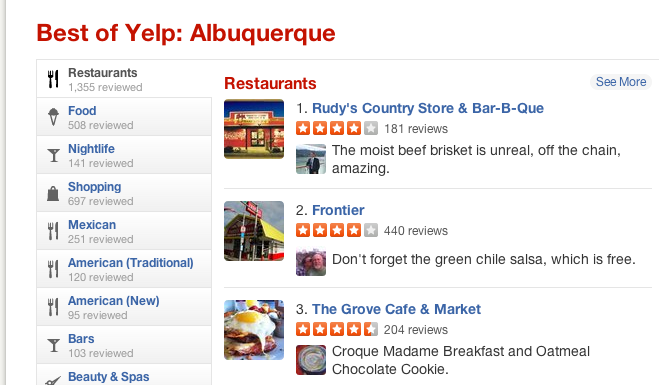How To Make Sure Your Yelp Restaurant Reviews Aren’t Completely Worthless
 While authorities in New York concern themselves with the legal issues involved with businesses that post fake online reviews on Yelp and other sites, some are asking a more important question: Is there any real worth to crowd-source restaurant reviews?
While authorities in New York concern themselves with the legal issues involved with businesses that post fake online reviews on Yelp and other sites, some are asking a more important question: Is there any real worth to crowd-source restaurant reviews?
“Most anonymous online ‘reviews’ — whether over-the-top favorable or savagely harsh — are rubbish even when they’re real,” writes New York Post critic Steve Cuozzo. “Diners with an IQ greater than that of seaweed know it.”
He points out that you’ll find the same over-exaggerated language used by shills — “AMAZING!!”, “UNFORGETTABLE” — used repeatedly in reviews that appear to be written by actual people, and that you’ll find this sort of bizarre enthusiasm used to describe all manner of eateries, from spaghetti-and-meatball Italian joints to 4-star cuisine.
Cuozzo maintains that the truly worthless reviews on Yelp are the nasty, vengeful posts that are posted by people with chips on their shoulders. He makes a valid point about perhaps too much focus being put on false, positive reviews while allowing damaging, nasty write-ups to remain online because they appear to have been written by actual customers.
Once again, we get into that gray zone involving the immediacy and freedom permitted by the Internet.
Sites like Yelp allow consumers the opportunity to voice their opinions, and to do so before they’ve even been seated at a restaurant. And these reviews can give consumers some insight into whether an eatery might be to their liking.
But the system is so easily abused, no matter what walls or filters the sites put up, and no matter how many lawsuits are filed. There’s no requirement of proof that you ate at a restaurant, and to require such evidence in order to publish a review would turn a lot of potential reviewers off from posting their opinions. By that same token, I can go online right now and write whatever I want about some restaurant in Montana I’ve never been to, or a fictional fried chicken joint in New Mexico.
There’s no accountability for the reviewer, and thus they may feel free to be overly effusive about a meal that was only so-so, or they may be (as is more often the case) ridiculously acidic about a bad experience that they will probably forget about before their next meal.
To make your review worthwhile to others, here are my suggestions for things to keep in mind when you write a review on Yelp:
1. Am I Being Completely Honest?
It’s incredibly easy, when there is no one to confront you or discuss details, to omit or overlook certain facts to a story, or to exaggerate for effect. This is a huge problem with negative reviews, where people love to toss in phrases like “WORST MEAL EVER” and “RUDEST WAITER EVER” while leaving out facts like how busy the restaurant was that evening or that you ate the entire meal without complaining to the kitchen. This happens less frequently with positive reviews, but there are people who will offer glowing praise to a place when the experience was only above-par. Perhaps you really loved the restaurant because it has a nice view and the food was merely so-so? Think about your experience and be completely honest before putting fingers to keyboard.
2. Be Specific And Helpful
In the case of a positive write-up, don’t just trot out some exclamation points and vague terms like “amazing” and “yummy.” And when you’re angry, don’t just use the availability of Yelp to vent your frustration. Provide information that would be of use to a potential customer. What items did you eat? What in particular did you enjoy about them? At what point did the evening turn sour? How was the service, cleanliness, atmosphere? Simply saying a place has “f-ing rad pizza!” is of no real use to anyone but the pizzeria.
3. Sleep On It
Yes, you’re super-ticked right now about the waiter who forgot your Mr. Pibb refill, and you really, really want to tell the world about it RIGHT NOW!!! But Yelp will still be there in the morning (if it’s not, then we have a bigger problem on our hands), when you’ve probably moved on to a place where you can put your experience in perspective.
Want more consumer news? Visit our parent organization, Consumer Reports, for the latest on scams, recalls, and other consumer issues.

